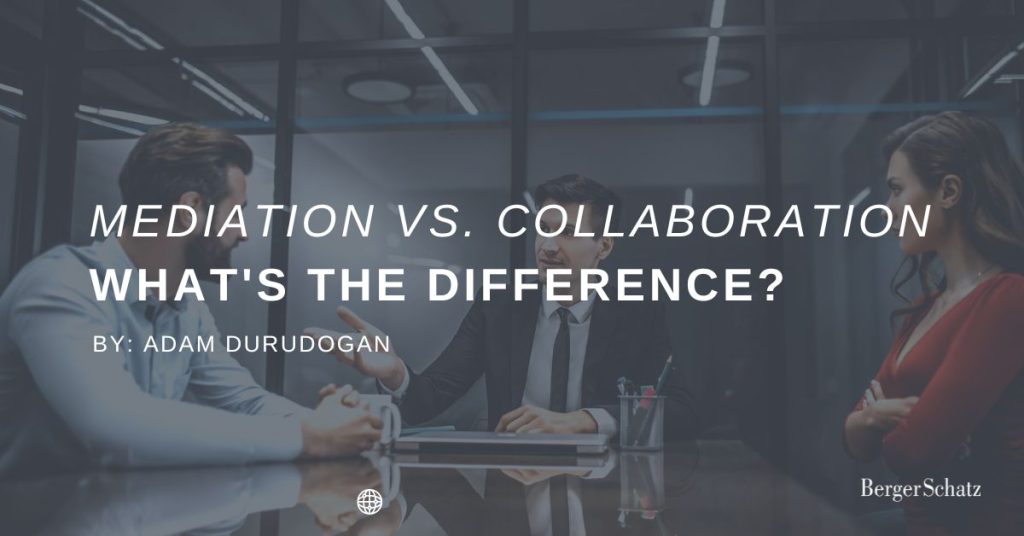
Alternative Dispute Resolution methods have become increasingly more popular the past 20 years. Many couples seek these methods to amicably end their marriage and remain out of court.
Two popular Alternative Dispute Resolution methods are Mediation and Collaboration. Although similar, there are key differences. We’re breaking down the differences, so you and your spouse understand which method is best suited for you.
What is mediation?
Mediation is a flexible, voluntary, and confidential form of Alternative Dispute Resolution. A mediator (neutral third party) assists both parties to help them accomplish a negotiated settlement of their dispute. Despite what the mediator suggests, mediation allows both parties to retain control of the decision and ultimately decide whether to settle and on what terms.
Benefits of Mediation:
- Informal – Mediation is a confidential process. The sessions are not recorded or transcribed. Mediators will not disclose any information revealed during the mediation sessions, and settlement discussions cannot be used in court proceedings. At the conclusion of the mediation, mediators destroy any notes they took during the mediation sessions.
- Flexible – Both parties involved have an equal say in the process, and they, not the mediator, decide the terms of the settlement. There is no determination of guilt or innocence in the process. This can be particularly helpful in preserving amicable relationships.
- Inexpensive – Litigation is expensive. Mediation services are available at a cost that is often lower than the alternative of litigating certain issues. Parties have no obligation to hire an attorney or other advisors.
What are the downsides to mediation?
- No legal authority – As the mediator has no power or legal authority to impose a resolution of the dispute (i.e., bind the parties to a determination), the parties must be willing to compromise and come to a mutual agreement. If no agreement is reached, the parties will have to incur additional costs and expend more time to pursue recourse within the court system.
- Information Gathering – If one of the parties in a dispute cannot entirely address a case/issue without first receiving additional information from the other side, mediation doesn’t provide a way to compel disclosure. The party seeking disclosure is forced to rely on the good faith of the other side, however, this runs the risk of important information being withheld during the mediation process.
What is Collaboration?
Collaborative law is a newer practice of Alternative Dispute Resolution that mainly arise in cases of divorce and family law. This method is used when parties believe legal representation is needed to come to an agreement. It involves each party hiring a collaboratively trained attorney and other professionals like; financial experts, parenting specialists, or divorce coaches, to name a few. The parties and their attorneys meet in a non-adversarial environment.
Benefits of Collaboration:
- Legal Representation – Attorneys and other professionals are working together to help the couple, rather than working against one another to “win”, as is frequently the case during a litigated divorce. The collaborative process also allows the parties to proceed at their own pace, rather than being at the mercy of the court’s schedule.
- No Court Agreement – Both parties and their attorneys sign a “no court” agreement, meaning they cannot use or threaten the use of the court system. If one party threatens a lawsuit, the collaborative law process terminates, and the lawyers cannot participate in further dispute. This allows pressure to be removed from both parties and for them to communicate in good faith with one another.
- Confidential – Collaboration is generally kept confidential. In traditional litigation, almost everything you file in court is public. Collaboration means that very few papers are ever filed. Also, upon resolution, both parties must agree on the language that is put in the final court documents.
What are the downsides to collaboration?
- Expensive and timely – Although collaboration can be much more cost-effective compared to traditional litigation through the court system, it can be more expensive and take longer than mediation. This is because you are involving multiple professionals vs. just one mediator.
- Inefficient if no resolution – If parties cannot come to an agreement, the process becomes inefficient and essentially places both parties back at square one. In this instance, both parties must start the divorce process entirely over with traditional adversarial counsel and litigation. When this happens, this results in additional expenses and further time spent resolving the dispute.
There are no perfect methods when seeking legal counsel. It’s important that both you and your spouse understand your options and select the method that works best for you. If you are unsure of where to start, an attorney can help guide you.
Post authored by: Adam Durudogan